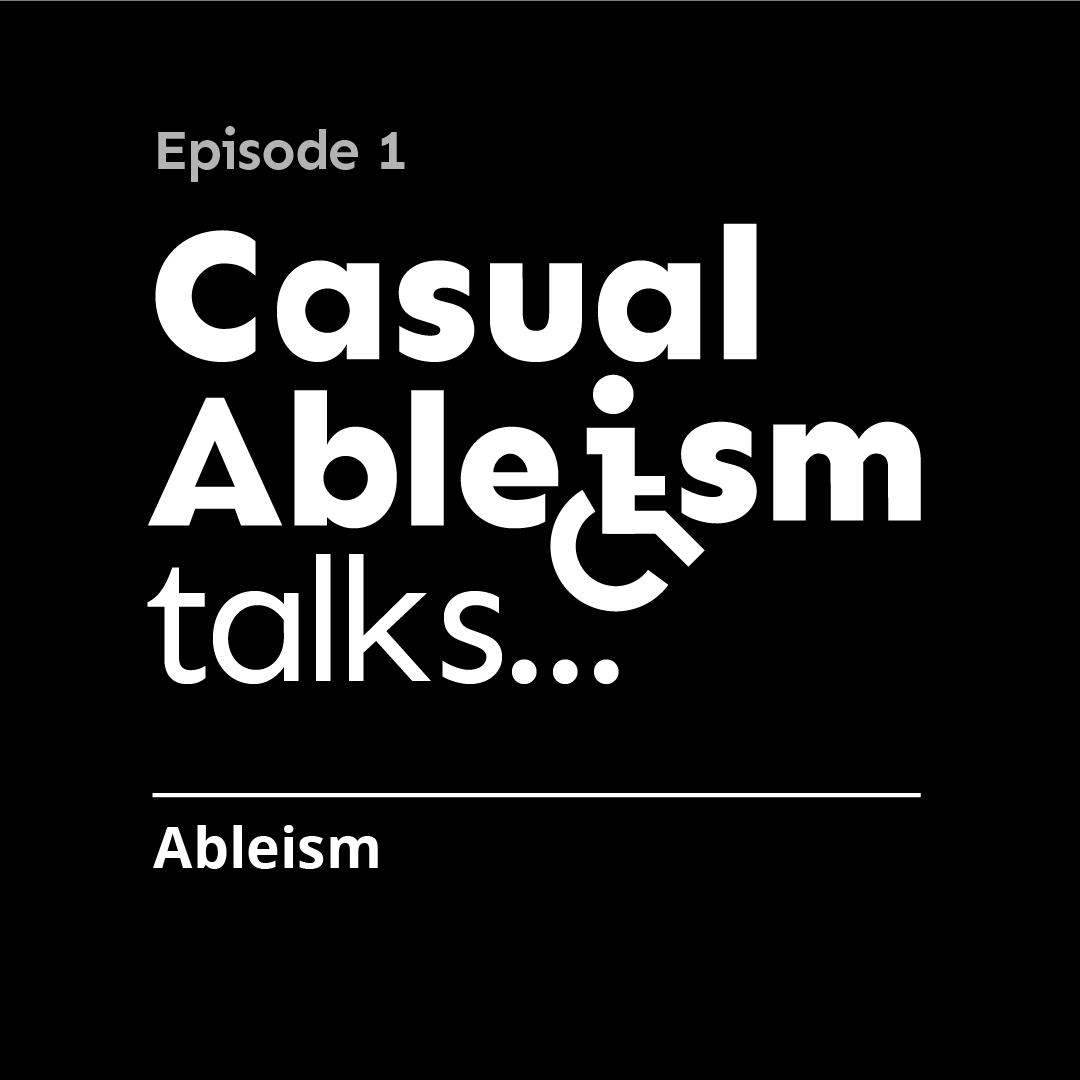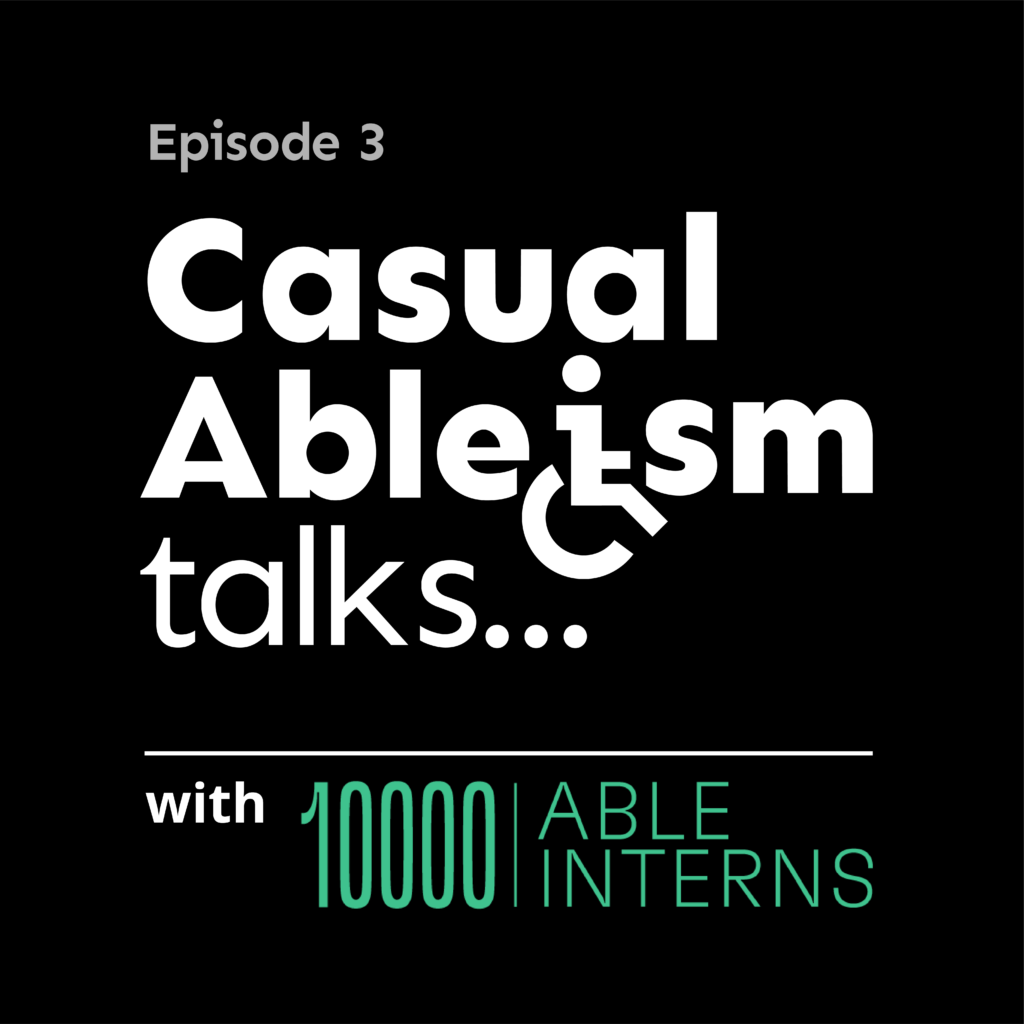
Episode 1
Casual Ableism talks... Ableism
Episode transcript
Casual Ableism talks... The Podcast host, Laura:
Hi friends, it’s Laura here and welcome to the first episode of Casual Ableism talks…The Podcast. In our first episode, Casual Ableism talks…ableism, we’ll be discussing what ableism is, the different types of ableism and examples of ableist comments and/or situations. Don’t forget that this episode will be transcribed and available to read as a blog post on our website. The link will be in the episode description, or just head over to casualableism.com/podcast. Right, let’s get into it.
What is ableism? Ableism is the discrimination of disabled/chronically ill people, in favour of non-disabled or able-bodied people. It also refers to the mentality of what stereotypically people think a disabled person should look like or what they should/shouldn’t do.
Disability is a huge spectrum, so everyone’s own lived experience is different. Some people may not feel that certain situations are in fact ableist, and they may not feel affected by them; but others may well feel that situations are ableist. We always say that everyone has their own lived experience and their own relationship with disability, so we all need to be aware, and respectful of that when discussing examples of ableism.
So what does ableism actually look like in terms of real life examples? Well we always categorise ableism into different types. There is the normal overall ableism, there is educational ableism, workplace ableism, invisible illness or hidden disability ableism, internalised ableism and what we call casual ableism. We will go into these different types of ableism in more detail.
General ableism is what we generally face on a day-to-day basis, whether that be from small remarks from people, situations we face or actions towards us just because we are disabled or have a health condition.
Examples of general ableism: “My friend, son, mother, cousin etc has that same disability/health condition and they can do xyz so you can too”. Being mocked for using a mobility device. The ableist narratives that fictional characters who have disabilities are the evil character, the joke or the pity character. Being told that you’re so lucky you get to sit down all day (in a wheelchair) or that you’re lucky you get to use the lift. People telling you that if you ate x food or did yoga then you could be cured from your illness. The bizarre concept that if you think positively then you will be cured, that it’s a negative mindset that is causing your disability or health condition. Someone with a colostomy bag being told “you’re so lucky you don’t need to buy toilet roll”. Or someone with food intolerances receiving a comment such as “oh I’d be so much skinnier if I couldn’t eat certain foods”. And lastly, someone with OCD being told “oh I wish I had OCD so my house was always clean”.
There are so many different examples of general ableism, but these are just few to give you an idea.
Educational ableism is ableism and ableist experiences that you face in education, whether that be in school, university, college or any type of learning environment, and even refers to whether you can actually access education.
Educational ableism examples can range from teachers or classmates questioning why do you get extra time in exams? You’re so lucky you get extra time in exams. Why do you use a computer in exams? Surely you’ll cheat if you can use a computer? Being told how lucky you are if you are off school ill or miss class for medical appointments. Other less obvious examples are about accessing education in general. Are there certain classes that are in classrooms only accessible via stairs? When you miss class due to illness or appointments, does your teacher give you the content you missed? Are school trips accessible? Or do you miss out because the locations aren’t accessible?
Workplace ableism is ableism faced in the work environment and can come from employers, colleagues, or future employers. Whether it’s being overlooked as an applicant because you have disclosed your disability/health condition, or the workplace isn’t accessible (i.e. no lift). Having to miss days of work due to illness or medical appointments.
Invisible illness or hidden disability ableism, is ableism that is experienced because you possibly don’t look disabled, or don’t fit the stereotypical image of a disabled person. Society in general still thinks that the only disability model is someone in a wheelchair who can’t walk, or an older person. But we all know that this isn’t true. We know that disability and chronic illness exists regardless of age and that there is such a huge range of how it looks to an outsider.
Examples are comments like “why are you using the disabled toilet? you don’t look disabled.”, “why are you using the disabled parking place? you don’t look disabled.” “But you look fine, you don’t look ill?”
Internalised ableism is ableism that, as people with disabilities or health conditions, we may face within ourselves. This is a harder example to talk about, because everyone will have their own version of internalised ableism and there will be so many different types. Internalised ableism can be as simple as feeling like you’re not going to be able to make friends because you’re disabled. Or it could be that you’re worried you can’t be as productive as someone else due to your health condition.
We classify Casual Ableism as the subtle comments or situations where it isn’t overtly obvious that what has been said or done is ableist, but it actually is. It’s the things we have to face that people perhaps don’t believe are ableist and therefore makes it harder to educate society about because people tend to think we’re overreacting. For example, old men asking if they can hitch a ride on a mobility aid, or asking “do you have a license for that?” When you’re out in your wheelchair or with your mobility aid and someone asks a question to the person that you’re with instead of to you yourself. Even friends/family members saying they’re embarrassed or inconvenienced by you or your health condition.
There are endless examples of different types of ableism and different ableist experiences. Every type of disability and every type of health condition is subjected to its own type of ableism.
Our social media initiative Casual Ableism is a platform where we share real life ableism experiences, experienced by real disabled or chronically ill people. It’s a safe space to have your voice heard, share your experience with others who know exactly what it’s like, and to also use these experiences to raise awareness and educate society about ableism. If you head over to the Casual Ableism Instagram account, then you can see so many different experiences of ableism that have been submitted to us.
If you’d like to share an experience of ableism with us and have it posted on Casual Ableism’s Instagram, then head to the Google form link in this episode description, or go to CasualAbleism.com, to submit your experience. You can choose to be anonymous if you’d prefer, or we can tag you in the post, it’s completely up to you.
We hope you’ve found this episode Casual Ableism talks…ableism useful. We’ve talked about what ableism is, the different types of ableism, and shared some examples of the different types of ableism that we face as disabled people and people with health conditions.
There is no right or wrong way to feel about the ableism that we face as individuals, and we all have our different ways of dealing with it.
We hope to continue using our platform to shine a light on ableism and educate society.
Before we end, we just wanted to ask you all a question, what is the most surprising ableist comment or situation that you have experienced? Let us know in the episode poll or leave a comment over on our Instagram, Casual Ableism Talks Podcast.
Thank you so much for listening to this episode. Don’t forget to follow us so you don’t miss any of our content.
Bye!

